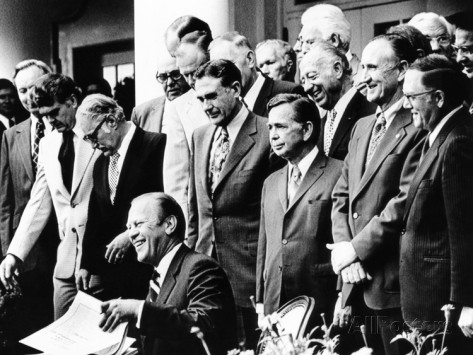

On this day in Labor History the year was 1974.
That was the day that President Gerald Ford signed the Employee Retirement Income Security Act.
The act was passed over growing concern about the mismanagement of private pension plans.
In 1963, the Studebaker Corporation closed its auto plant.
Its pension plan was in shambles nearly seven thousand workers received only fifteen percent of their pension or nothing at all.
Across the country more and more workers were relying on private pensions.
In 1960 21.2 million workers had private pensions.
By 1970 the number stood at thirty million.
The funds in those pensions had nearly tripled in that same decade to $138 billion.
Ensuring the security of those pensions was essential for millions of workers and the stability of the economy.
At the bill signing, President Ford explained, “Dramatic growth in recent years has thrust private pension plans into a central role in determining how older Americans live in their retirement years. Yet, this same growth in pension plans has brought with it a host of new problems. Many workers have ultimately lost their benefits - even after relatively long service - because when they left jobs, they thereby gave up rights to hard-earned pension benefits. Others have sustained hardships because their companies folded with insufficient funds in the pension plan to pay promised pensions. In addition, some pension funds have been invested primarily for the benefit of the companies or plan administrators, not for the workers. It is essential to bring some order and humanity into this welter of different and sometimes inequitable retirement plans within private industry.”
President Ford signed the bill on Labor Day, and outlined minimum standards for private pensions.
More Episodes
All Episodes>>You may also like
Create Your Podcast In Minutes
- Full-featured podcast site
- Unlimited storage and bandwidth
- Comprehensive podcast stats
- Distribute to Apple Podcasts, Spotify, and more
- Make money with your podcast











